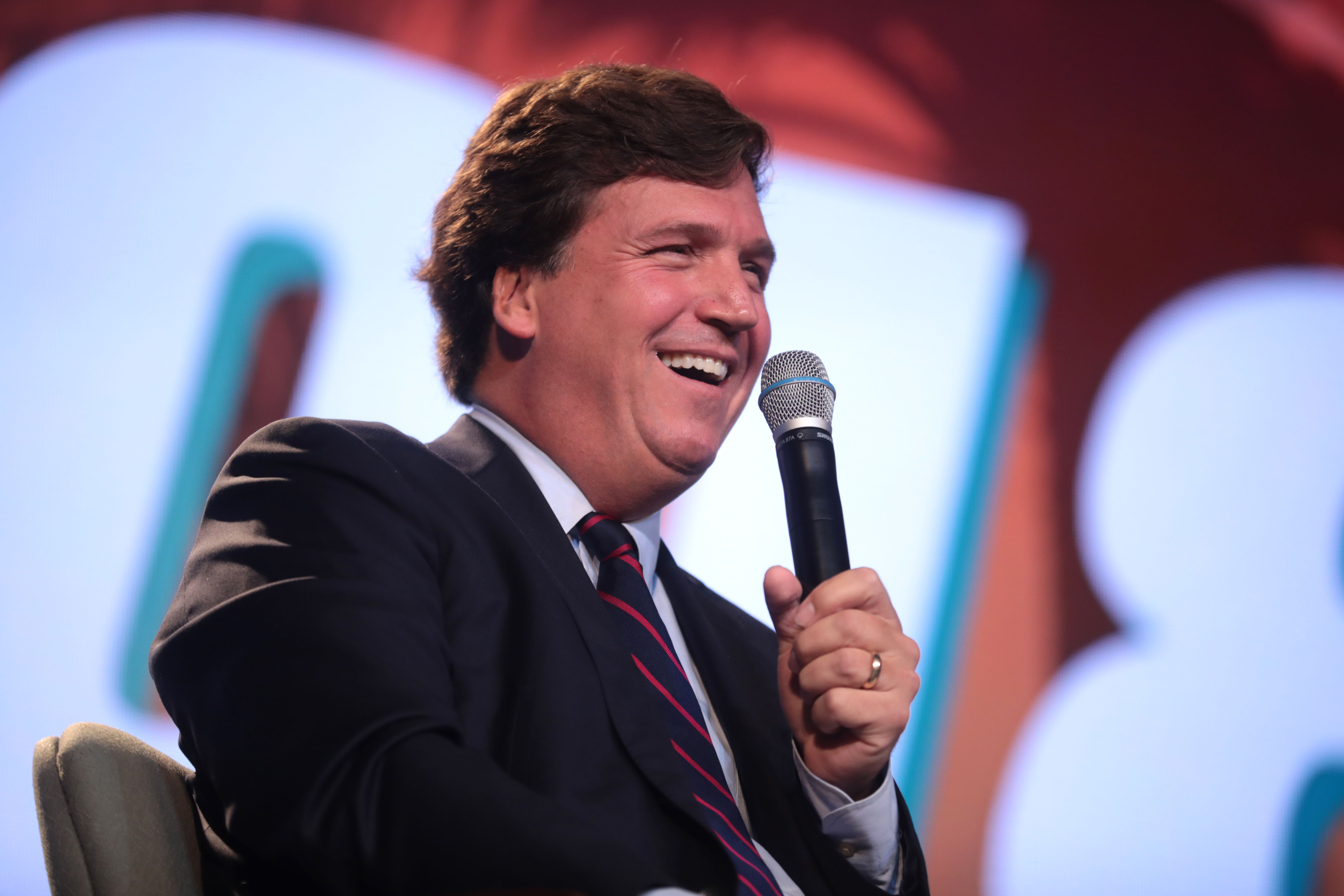*Published with the generous permission of Teri Kanefield. Read all of her writing here.
By Teri Kanefield
The announcement that NBC / MSNBC hired former RNC Chair Ronna McDaniel as a contributor prompted an “open revolt” by MSNBC “stars,” who went directly to their TV and social media audiences to denounce the hiring because (among other things) McDaniel supported Trump’s lie that the election was stolen.
In response to the revolt, the network executives changed course and fired McDaniel. One of my readers said this:
It was good to see that at least some of MSNBC’s on-air talent still has enough journalistic integrity to risk their careers over this and put their foot down.
MSNBC’S executives? Not so much.
Indeed, the standard response on left-leaning social media is that the MSNBC hosts acted with integrity, thereby earning approval and support from their audiences.
Because I spent much time over the past 5 years tamping down misinformation and conspiracy theories originating from MSNBC legal experts and contributors, I had to take some time to think about the “journalistic integrity” part. In fact (ironically) as the story about McDaniel was unfolding, I was watching in dismay as yet another left-wing conspiracy theory emanated from the MSNBC legal pundits.
I therefore spent some time thinking about the McDaniel hiring debacle and came up with a different take. While I agree that the NBC and MSNBC executives made a mistake, I locate the mistake in a different place.
Stick with me here. It will a few pages for me to make my case because I need to bring in some scholarly work on the nature of cable news shows.
Recall from Part II of the Information-Outrage Cycle that the MSNBC (and CNN) Business Model is to hire Partisan Pundits who Offer Emotionally Evocative Performances
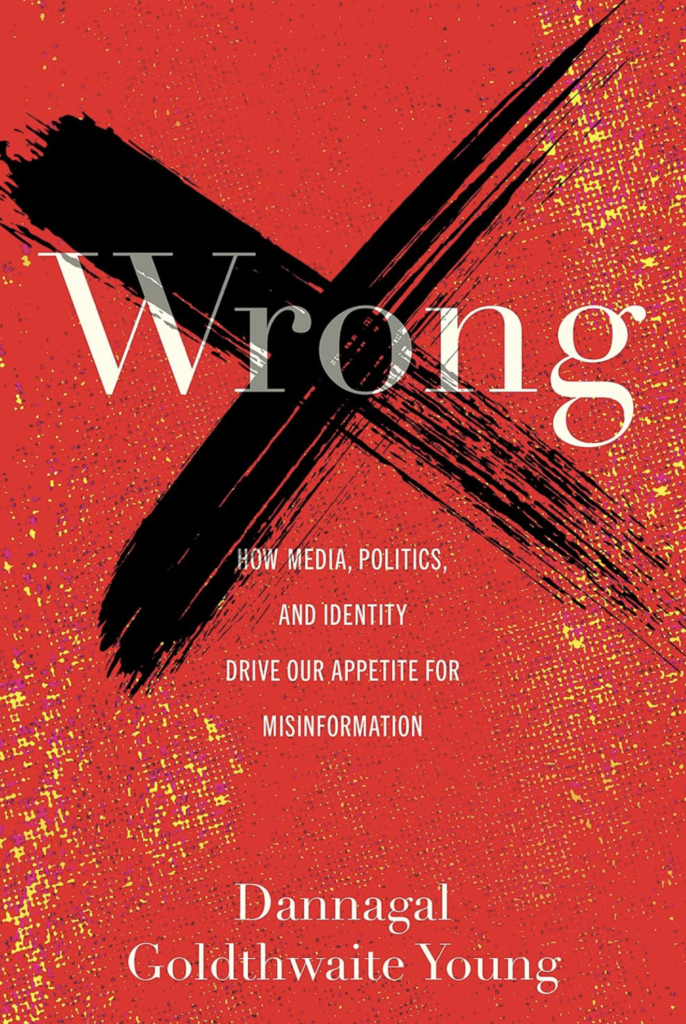
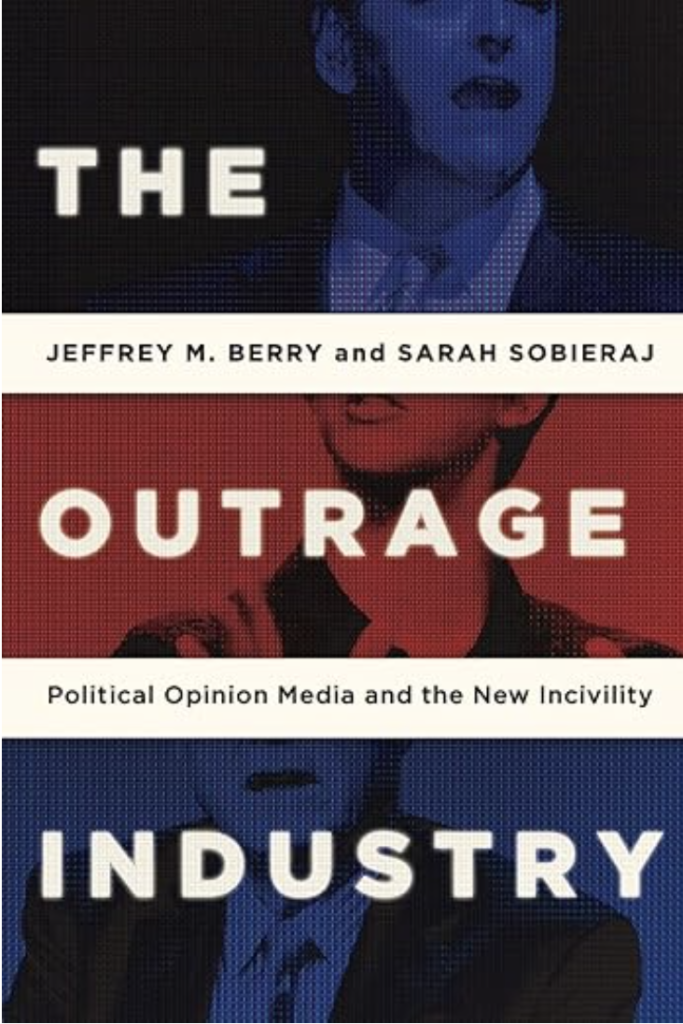
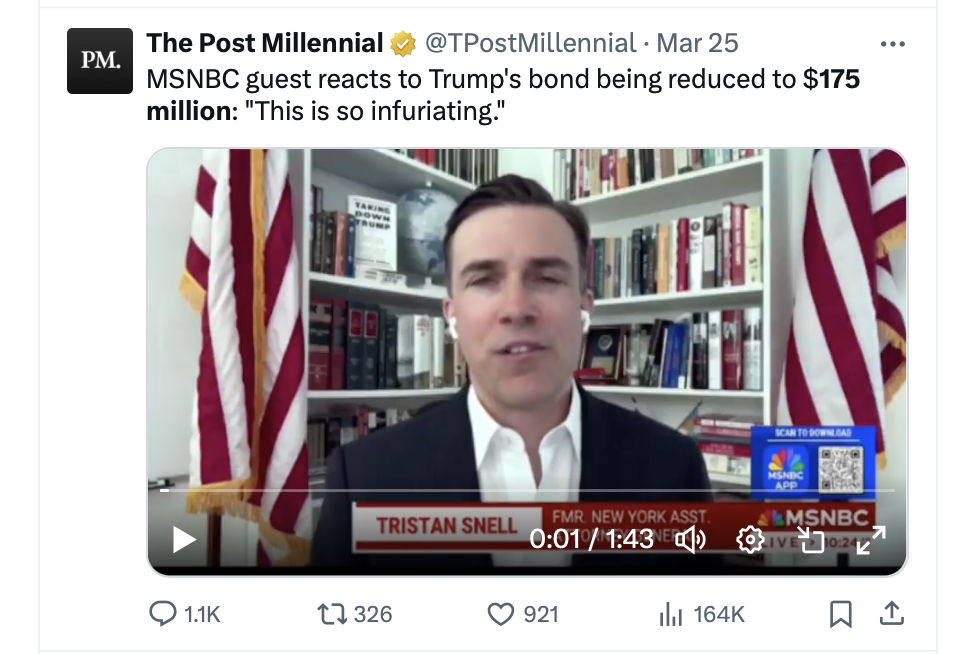
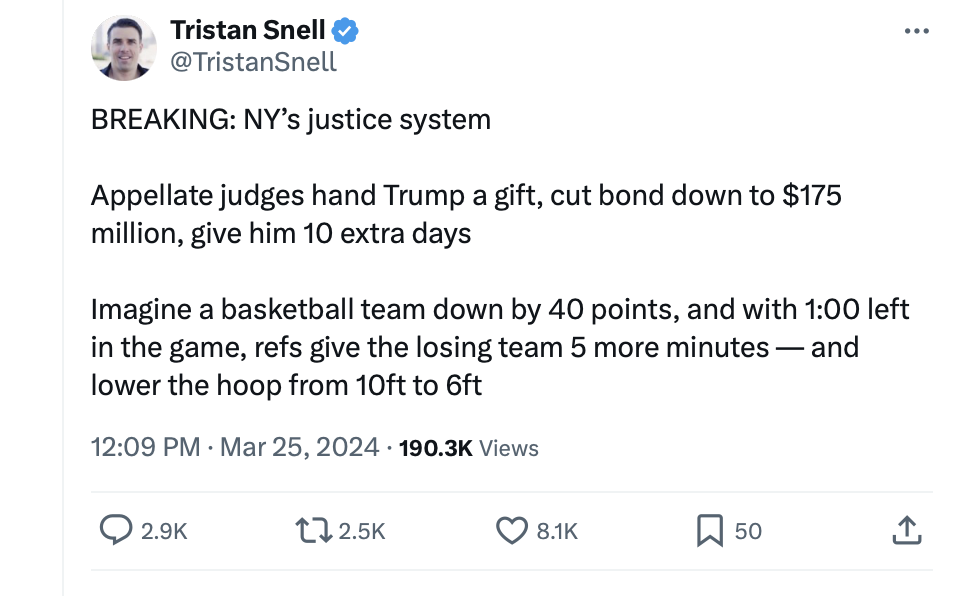
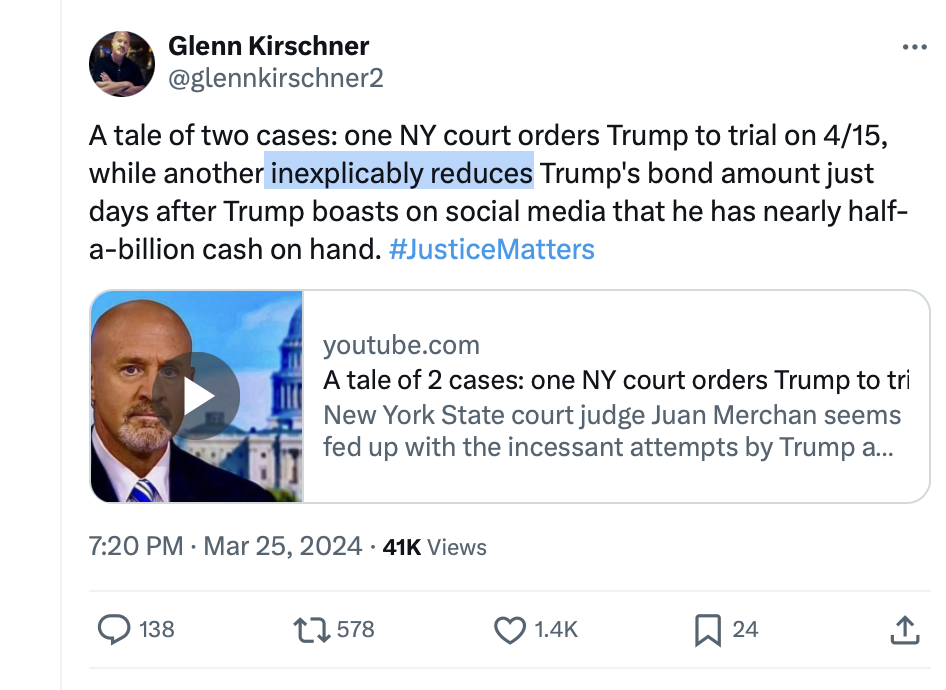
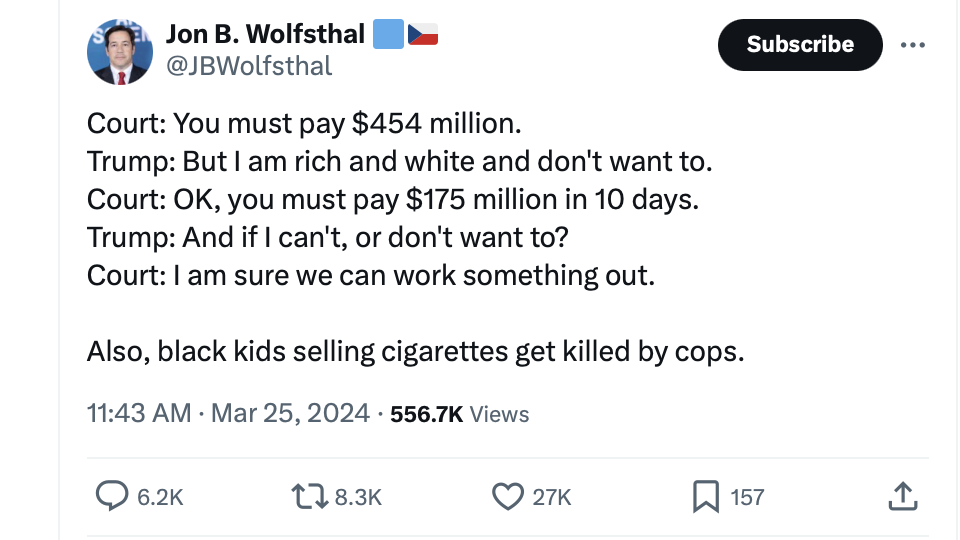
Jon B. Wolfsthal is not a lawyer. His post is filled with inaccuracies, misrepresentations, and flawed logic, but it got a lot of engagement. His post has 27K “likes.” His Twitter account has a “subscribe” button, which means that for $3 per month, you can subscribe to his account. I am not sure what you get for $3, but if he can attract enough subscribers, he can make decent money. 5,000 subscribers = $15,000 per month for tweeting.
The MSNBC and CNN Business Model Thus Creates Fertile Ground for Misinformation and Conspiracy Theories
Here is Prof. Young’s definition of a conspiracy theory:
Conspiracy theories attempt to explain the ultimate causes of significant social and political events and circumstances with claims of secret plots by two or more powerful actors. They assume that powerful people operating in the shadows are bad actors deliberately keeping the public in the dark. (p. 42.)
Here is the pattern she describes:
A recent example of a right-wing conspiracy theory
When the Francis Scott Key Bridge collapsed, right-wing commentators immediately blamed minorities and immigrants, like this:
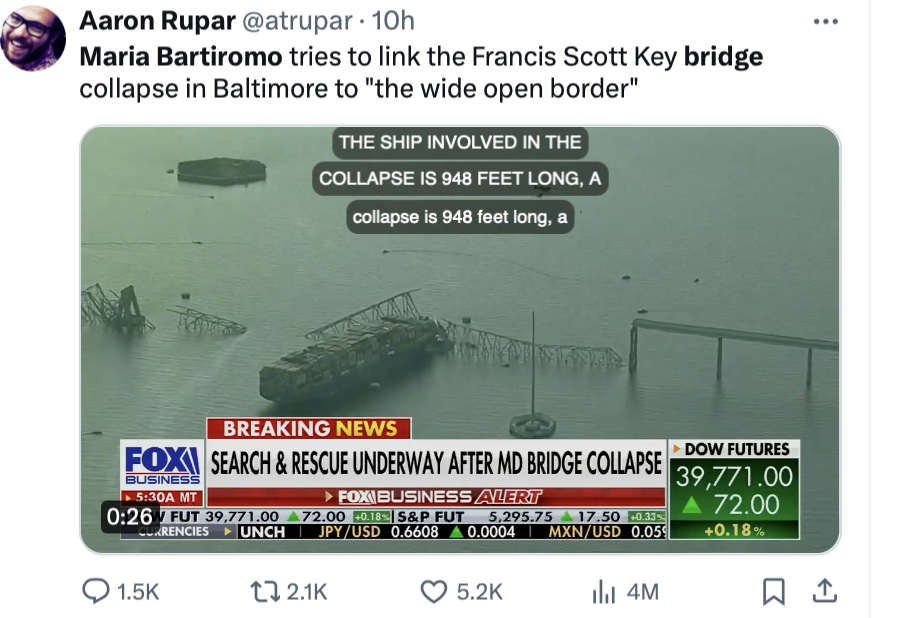
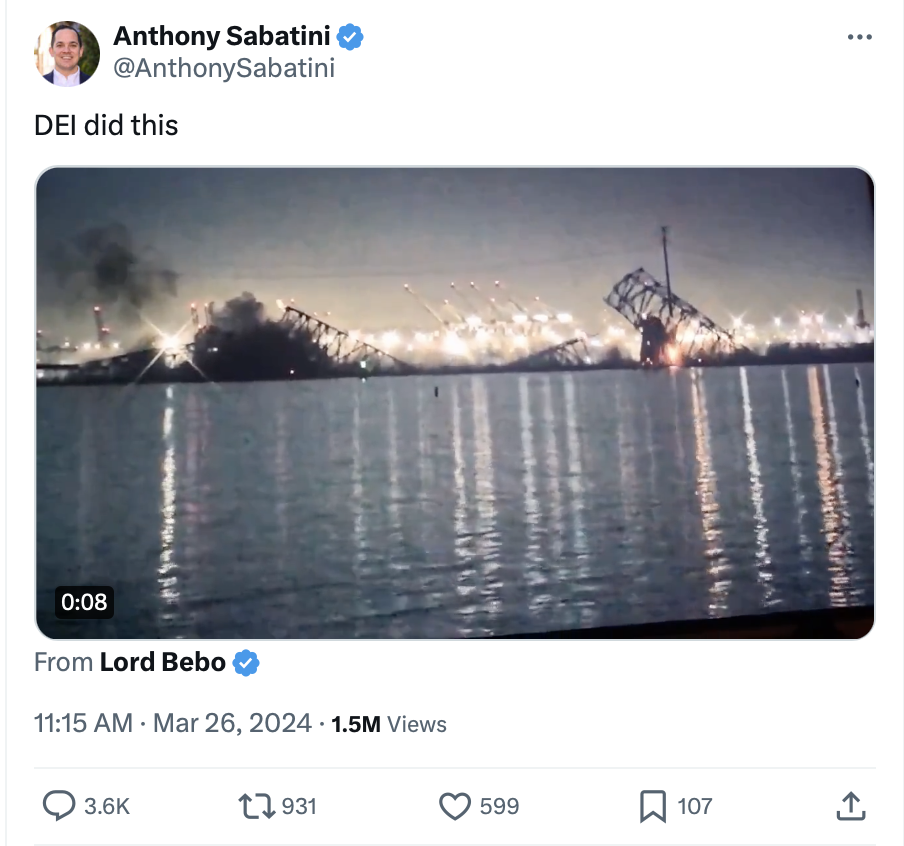
Basically Trump claimed that 10,000 new documents were dumped on him at the last minute as part of a “strategy to hide the truth.”
On March 14: Bragg confirmed that his office had received the documents from the Southern District of New York. Bragg agreed to a 30 day extension to evaluate the documents and get to the bottom of Trump’s claims.
Also on March 14: The Court agreed to a 30-day delay to assess what had happened. The court ordered a hearing on March 25.
To emphasize: As of March 14, nobody knew what was in those documents or why they were transmitted at the last minute.
Factual reporting would look like this:
The court agreed to a 30-day delay in the trial to assess Trump’s claims. We should have answers on March 25.
Cable news shows have hours to fill. Facts will not fill those hours, so the legal experts and contributors appeared on screen and responded by looking for a way to assign blame, like this:
Andrew Weissman appeared on MSNBC. (You can see the clip here.) The host asks Weissmann “What is going on?” Of course, he doesn’t know. But he speaks firmly and decisively when he says, “At the very least this is a massive screw-up on the part of the Southern District of New York Prosecutors.” He accuses the SDNY prosecutors of “poor judgment.”


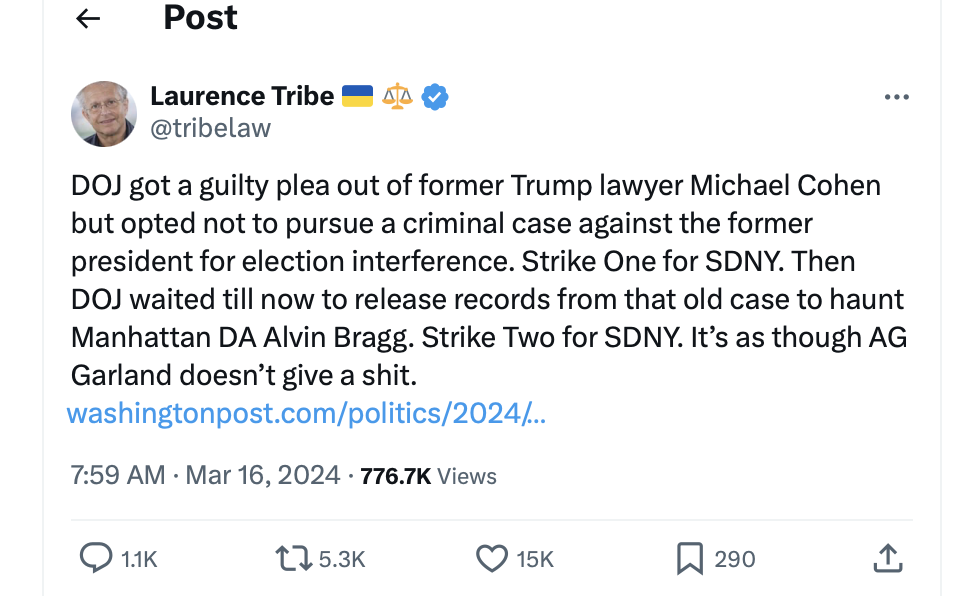
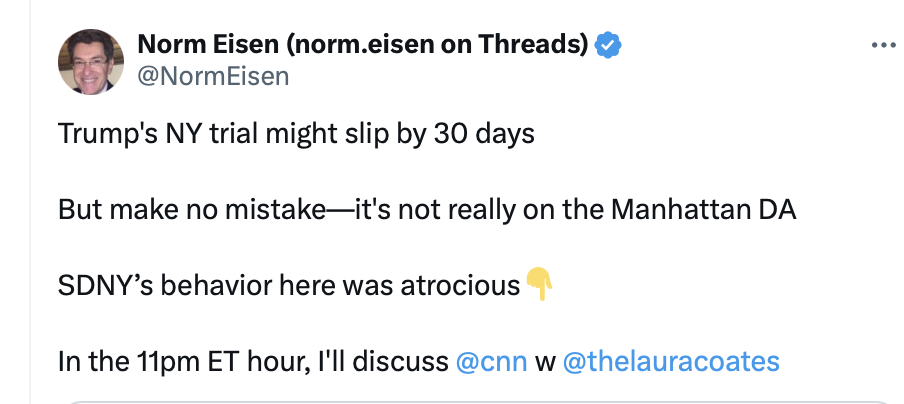
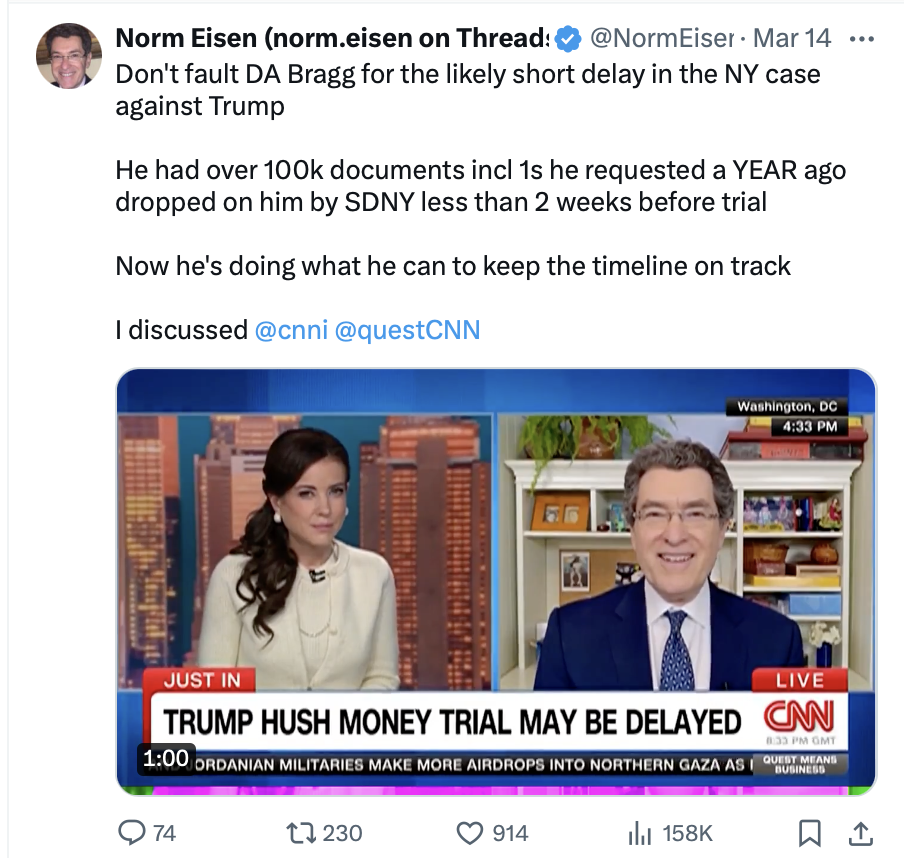
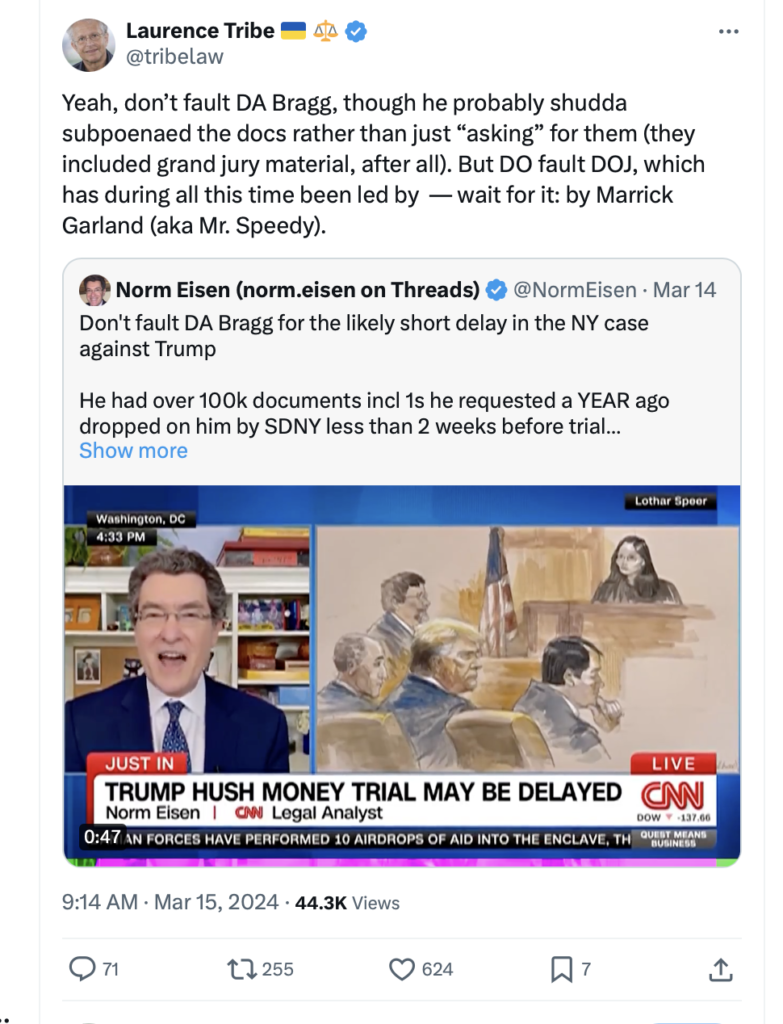

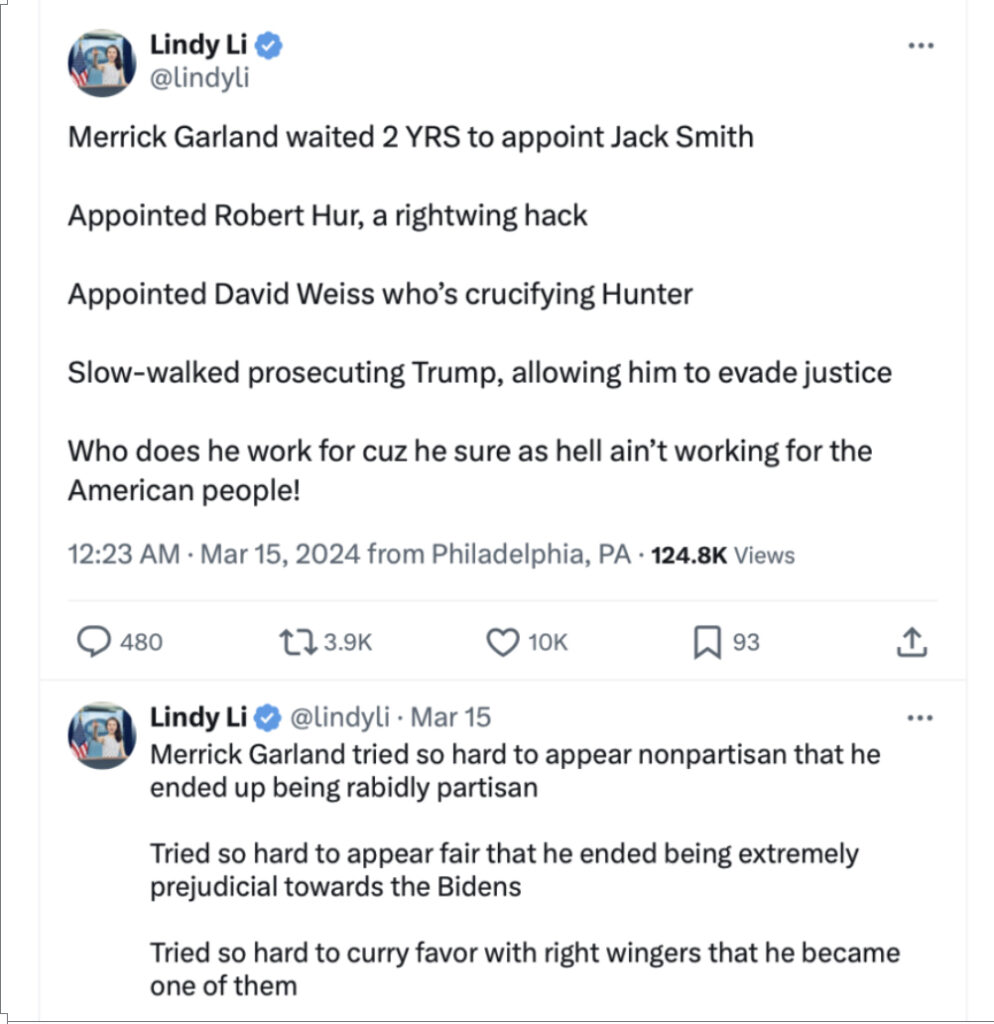
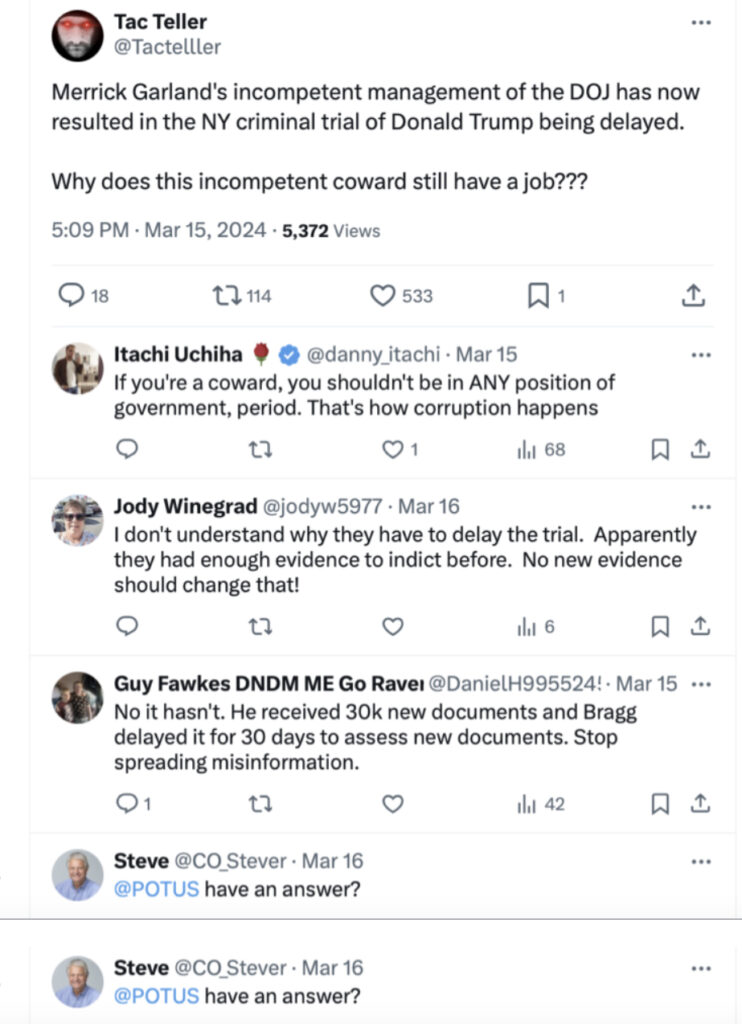
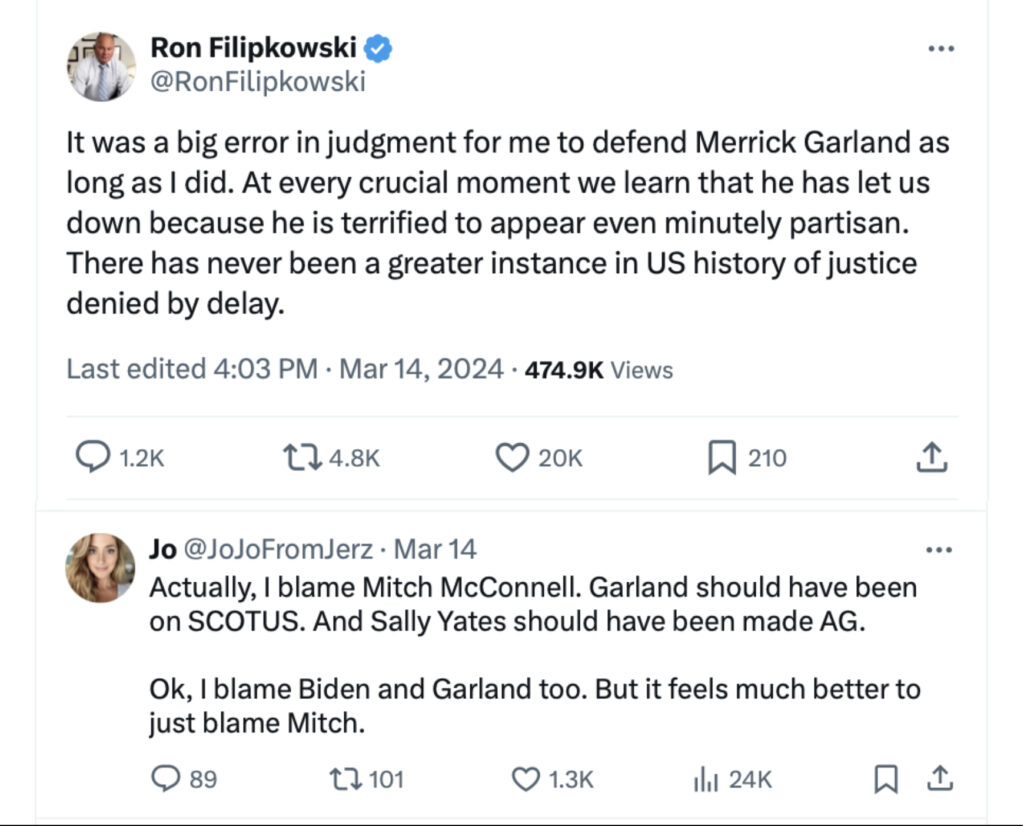
This is from a Washington Post piece, which you can read free through my subscription.
When the network executives first approached McDaniel, she preferred to appear only on NBC because she was afraid of facing harsh interviews and that liberal-leaning viewers would not respond to her positively, but the NBC execs persuaded her to appear on both NBC and the more liberal (partisan) MSNBC.
MSNBC President Rashida Jones participated in recruiting McDaniel.
McDaniel’s relationship with top NBC executives began last fall, according to people familiar with what took place. NBC was determined to secure a Republican primary debate, repeatedly talking to RNC officials about their chances and even sending star anchor Lester Holt to Washington for a pitch meeting at RNC headquarters. RNC officials wanted to give at least one debate to a nonconservative news outlet in a bid to broaden the party’s outreach.
In a friendly call between Jones and McDaniel, the two spoke about American politics, their young children and the need to have differing views on the airwaves.
Indeed, offering “differing views on the airwaves” is what the cable news panels do.
When announcing the hire, the executive said this:
“As we gear up for the longest general election season in recent memory, she will support our leading coverage by providing an insider’s perspective on national politics and on the future of the Republican Party — which she led through some of the most turbulent and challenging moments in political history,” the memo continues. “And as a longtime Michigan resident, she’ll be an important voice from one of this year’s key battlegrounds.”
It appeared that the executives thought that the way to strengthen the news portion of the organization was to have a voice from the other side, and the way to enliven the talk show portion was to have someone with a different viewpoint.
The MSNBC Hosts and Contributors are not news reporters. They are personalities. They are not out there with their microphones asking senators questions as they hurry from one meeting to another. They are not on the ground taking photographs during an emergency.
They are not running off to cover the latest Congressional hearing for their newspaper or network. They don’t break stories. They respond to stories.
Reporters need sources. They need sources who are Republicans as well as Democrats, so they work to cultivate sources. Their goal is to gather accurate news, which means being able to confirm stories with multiple sources.
How McDaniel on the staff could have helped the news reporters: If a story was breaking, McDaniel could call her friends who are still on the inside of the Trump machine, but who are disillusioned with Trump and willing to talk to someone who they trust.
From The New York Times (and other outlets): NBC political reporters remained concerned that Republican officials, who have mocked the network’s leadership for refusing to keep Ms. McDaniel, may now be reluctant to engage on stories.
Partisan Talk show hosts have different needs. Partisan talk show hosts need to grow their viewership and retain the loyalty of their viewers. On Rachel Maddow’s best days, she can attract more than 3 million viewers, but 81 million people voted for Biden. The way to increase her viewership is not to appeal to Republicans, which will cause a lot of current viewers to leave. The way to increase viewership is to enlarge her appeal to Democrats.
Given How McDaniel talks about issues, and given how cable news programs operate, NBC and MSNBC executives erred in thinking that it would be a good idea to have McDaniel appear on liberal talk show panels.
On Sunday immediately after the news of her hiring was made public, McDaniel appeared on Meet the Press and was interviewed by Kristin Welker. You can see the transcript here. The full broadcast is here.
When asked about Trump’s promise to “free” the people convicted of participating in the attack if he is elected president, she said this:
I want to be very clear: The violence that happened on January 6th is unacceptable. It doesn’t represent our country. It certainly does not represent my party. We should not be attacking the Capitol. We should not be having violence. I said it that day. I put a statement out that day that this is not acceptable. If you attacked our Capitol and you have been – have – and you’ve been convicted, then that should stay.
When asked why she didn’t speak out earlier, she said that as the RNC chair, she could not do that. She needed to remain “neutral.” She said that sometimes you have to “take one for the team.”
(She was widely mocked for that comment, by the way. Among those who mocked her was Liz Cheney.)
After saying she had to remain neutral, she added that now that she was no longer RNC chair, she could say whatever she wished. She also said this:
And I disagree with [violence]. I agree with him on a whole host of other things. Let’s close the border. Let’s make sure we have good incomes for people. Let’s make sure we do a lot of great things. But on that point, I don’t think we should be freeing people who violently attacked Capitol Hill police officers and – and attacked the Capitol.
She also said she will vote for Trump again because she agrees with much of his politics.
Finally, she backed away from saying Trump was responsible for the attack and in fact, said that she didn’t think he wanted the attack to happen. She also added that the RNC had nothing to do with the attack.
Here is an example of how McDaniel responded to the question of whether she regretted her actions on November 17 when Trump “pushed Republicans not to certify the election”:
I’m glad you asked me about this, because I’ve never had a chance to respond to this. And if you know the course of what happened that night these two individuals went into a hearing, they voted no. They didn’t vote not to certify. They said, “You know, we want an audit.” There were some problems in Wayne County. They’ve been consistent. They’ve been well documented over subsequent elections. And they said, “As canvassers, we think we should have an audit before we certify.” That’s all they asked for. Once the public hearing opened they were called such vicious names, such vile names, family members were being threatened, that they changed their vote, and they left shaken. And I did call them and say, “Nobody” – and I think we should agree with – on this as Republicans and Democrats – “Nobody should be threatened or bullied or pushed to change a vote.” And that’s what happened to them. And I want to finish by saying our call that night was to say, “Are you okay?” That’s my recollection. It was three and a half years ago. These are people I knew. I live in Wayne County. “Are you okay? Are you all right? Vote your conscience,” not pushing them to do anything. And then let me finish – let me add one other thing. She [the person voting] was threatened to such a degree that somebody’s gone to jail. I’m not going to say the threats that she had . . .
See the problem? She’s trying to explain. She is muddying the waters. She is rationalizing.
She minced her words.
I read the transcript but I have no idea whether McDaniel was telling the truth about what happened on November 17. Was her call perfectly innocent? Was she just calling her buddies to find out if they were okay after they were threatened?
If you ask a person questions, and no matter what she says, you will think she is lying, there is no point asking her questions unless the idea is to (verbally) slice her to ribbons while the audience cheers, and that doesn’t seem like a fair reason to hire someone. On the other hand, if she was telling the truth about what happened that night and people believe her, you suddenly introduce nuance and complexity, and according to the authors of The Outrage Industry, that isn’t acceptable on cable news shows:
“Outrage sidesteps the messy nuances of complex political issues in favor of melodrama, misrepresentative exaggeration, mockery, and hyperbolic forecasts of impending doom. Outrage talk is not rational discourse. . . instead, it takes the form of a verbal competition, political theater with a scorecard.” (The Outrage Industry)
The problem is that these shows are about putting opinions side by side. It doesn’t matter if someone is wrong. What matters is the nature of their opinions.
If only facts were allowed, Pinocchio himself could appear on the show and it would not matter because he would be fact-checked in real time. The viewer would not be given multiple opposing views. They would be given the facts.
It seems to be acceptable to say things that are not true and even float conspiracy theories as long as the pundit offers an emotionally evocative performance of partisan identity.
Saying something untrue about Merrick Garland is acceptable as long as the point is that Trump committed crimes and should be prosecuted. Implying that a court is corrupt when it lowered Trump’s bond even though there was no evidence of corruption is acceptable as long as the person is also slamming Trump.
In traditional news environments, the editors and executives make the decisions, and reporters do what they are told. This is because reporters are sort of fungible. Lots of people want the job. Rachel Maddow is not fungible. “Without Rachel Maddow, there would be no Rachel Maddow Show.” (Quotation from The Outrage Industry.) In other words, the MSNBC stars have some weight to throw around.
When, en masse, the stars went on the air and made their case to their viewers about why McDaniel should be fired, they were not risking their careers. If all of them walk, MSNBC will crash.
I found a clip of what Rachel Maddow told her viewers here. I’ll offer the following summary:
Maddow opens with an emotional and moving tirade against Trump and how he attacks the free press and the integrity of elections and is trying to install himself as a strong man (but we are catching on to him.) She said, “He would have been forgotten if he hadn’t been able to attach himself to the Republican Party.”
She then accuses McDaniel of helping him do all of these things,
She then slammed the MSNBC leadership for not objecting to the hiring of McDaniel when the matter first arose. But, she praises the executive leadership for responding when the hosts and staff objected by promising that McDaniel would not appear on MSNBC.
Maddow was clear about this: Over the weekend, the MSNBC hosts were promised that McDaniel would not appear on any MSNBC shows (presumably unless one of the hosts chose to invite her.)
But Maddow did not stop there. She then said that the fact McDaniel is nonetheless on the payroll at NBC News is “inexplicable . . . and I hope they will reverse their decision.” She said, “You wouldn’t hire a mobster to work at a DA’s office. You wouldn’t hire a pickpocket to work as a TSA screener.”
In other words, she put pressure on the executives to reverse their decision and fire McDaniel. It wasn’t enough that she would not appear on MSNBC shows.
She also added, “This is a difficult time for us as a country” and “We have never dealt with anything like this before.”
My personal take: Maddow delivered an emotionally evocative performance of partisan identity. However, I recoiled from it, particularly when she said, “We have never dealt with anything like this before.” A Black American woman living in 1860 may see things differently. Perhaps it’s the defense lawyer in me (I dedicated my career to representing people who were among the most vilified members of our society) but I think it’s a little unfair to pin everything Trump ever did on the chair of the Republican Committee. The entire speech was an example of appealing to emotion over reason. I could assign it to a college class and ask them to find the transparent and manipulative rhetorical devices.
I will also confess that it was the first time I ever listened to Rachel Maddow speak.
(I have, however, watched a few Glenn Kirschner clips because I was fact-checking and wanted to confirm that he had indeed said what people said that he said. What struck me was the emotion in his delivery. He paused dramatically to say “Because. Justice. Matters.” After watching Rachel Maddow I understood what he was doing, but his performance was a poor imitation.)
I read some of the comments to Maddow’s speech on Twitter and saw how Maddow’s fans reacted. They were moved and sang her praises. She was the best! They adored her! The attack on Ronna McDaniel and pressure on the executives to fire her caused Maddow’s stock to go up with her viewers, which means her stock went up in general.
She and the other hosts won. McDaniel was fired.
I suggest that the firing of McDaniel will exacerbate partisan animosity and polarization. Firing a Republican after she made a plea for people to get out of the echo chamber and listen to each other seems problematic to me. (Not that any MSNBC viewers would have listened to her, but her plea may resonate with people who are not MSNBC viewers.) She was hired. She gave the interview. She was fired. It was, however, a win for the hosts, who earned the praise and loyalty of their viewers.
From The Outrage Industry: The outrage is not the result of polarization. It exacerbates polarization. The errors made by the executives will, unfortunately, exacerbate polarization.
I suspect that the executives now understand the power wielded by the stars and they will not make an important move without first consulting them. I will leave others to consider whether opinion shapers should call the shots for a news network (Remember I am distinguishing talk shows from news.)
McDaniel was right when she said liberal audiences would not respond well to her. The executives were wrong. There may have been a place for McDaniel at NBC News, but she should not have been sprung on the MSNBC hosts the way that she was.
At the same time, I am not sympathetic to programming that, as part of its model, tolerates conspiracy theories and rejects nuance as long as the conspiracy theories are the right kind of conspiracy theories.
This is from the U.S. State Department Office of the Historian:
“Yellow journalism was a style of newspaper reporting in the late 19th century that emphasized sensationalism over facts.” Yellow Journalists used a “sensationalist style,” and “bold headlines and creative drawings of events” and as a result, “sold a lot of papers for both publishers.”
“The peak of yellow journalism, in terms of both intensity and influence, came in early 1898, when a U.S. battleship, the Maine, sunk in Havana harbor. The naval vessel had been sent there in a display of U.S. power. On the night of February 15, an explosion tore through the ship’s hull, and the Maine went down. Sober observers and an initial report by the colonial government of Cuba concluded that the explosion had occurred on board, but Hearst and Pulitzer, who had for several years been selling papers by fanning anti-Spanish public opinion in the United States, published rumors of plots to sink the ship.”
In other words, the publications reacted to a major political event by making stuff up and casting blame.
Yellow journalism arose in a profit-driven environment when publications were competing for readers and learned that sensational rage-inducing material sold more newspapers. The owner of one of the newspapers, Hearst, allegedly said, “You furnish the pictures. I’ll furnish the war.”
In a recent newsletter, Heather Cox Richardson explained how the United States evolved past the era of yellow journalism:
The sensationalism of what was known as “yellow journalism” created a backlash that gave rise to new investigative journalism designed to move away from partisanship and explain clearly to readers what was happening in American politics and economics. In 1893, McClure’s Magazine appeared, offering in-depth examinations of the workings of corporations and city governments and launching a new era of reform.
History doesn’t repeat, it rhymes. In our current media disruption, as in the late nineteenth century, sensationalism is emphasized over facts.
I don’t expect to get out of the current era of yellow journalism through the rise of new publications. The problem right now is that there are too many publications and too many outlets competing for clicks and viewers.
I believe we will get out of the current era of yellow journalism by educating the public, particularly the young people. College instructors and teachers are helping students understand what is happening with the current media disruption and how to navigate the firehose of bad information.
